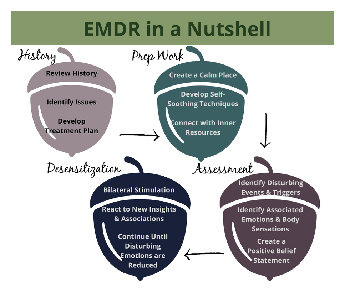
How is EMDR therapy different from other therapies?
EMDR therapy does not require talking in detail about the distressing issue or
completing homework between sessions. EMDR therapy, rather than focusing on changing the
emotions, thoughts, or behaviors resulting from the distressing issue, allows the brain to
resume its natural healing process.
EMDR therapy is designed to resolve unprocessed traumatic memories in the brain. For
many clients, EMDR therapy can be completed in fewer sessions than other
psychotherapies.
What Can EMDR Help With?
Before you decide whether you’re a good candidate for EMDR therapy, it’s important to know the various conditions it’s been known to treat and help with. The most common and obvious is PTSD.
EMDR can make the flashbacks and frightening memories often associated with a traumatic event into experiences within your control. Those thoughts are no longer negative and overwhelming, but something you can turn into a positive thought in order to move on. Because of that effect, EMDR is also incredibly helpful with a variety of conditions, including:
Anxiety
Grief
Phobias
Pain disorders
Personality disorders
Depression
That isn’t an exhaustive list. Any time you’re dealing with negative, overwhelming thoughts that feel like they’re taking everything over, EMDR might be able to help. It’s all about giving those negative thoughts less power, and replacing them with something better by shifting your focus.
Does EMDR Work for Everyone?
In short, yes. There have been multiple studies that show EMDR helps with the effects of different mental health conditions when compared to no treatment. Another draw that keeps EMDR in the spotlight is how safe and comfortable it is. It’s not uncommon for people, even those in talk therapy, to supplement their treatment with medication. There is nothing wrong with that, and certain prescriptions work very well for some. But, not everyone is comfortable with prescription medications, and many try to avoid them. EMDR is a great alternative, whether you use it on its own or as a complement to another type of therapy. The best way to determine if you’re a good candidate for EMDR therapy is to try it for yourself. Feel free to contact me for more information or if you want to set up an appointment.